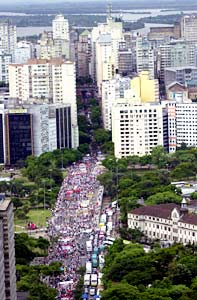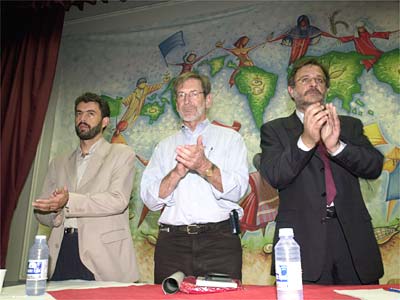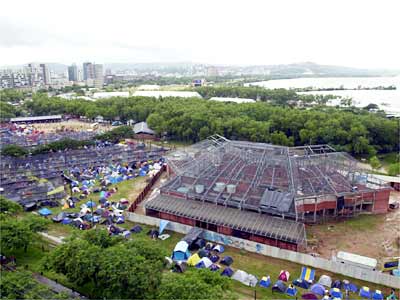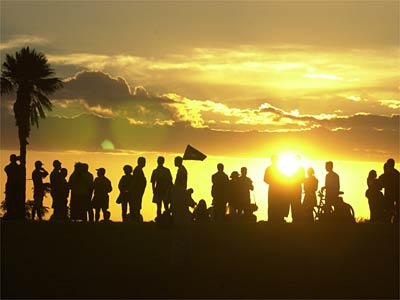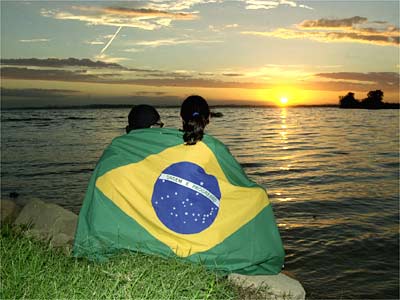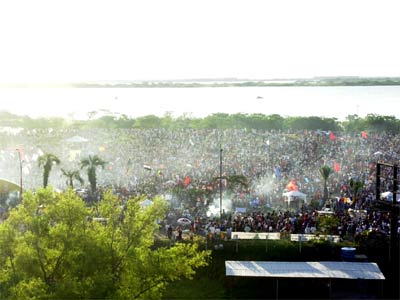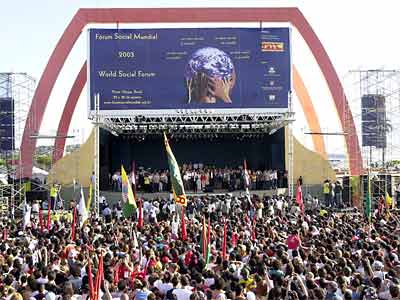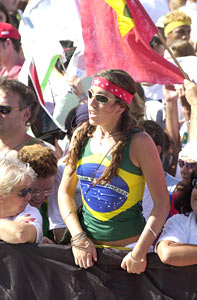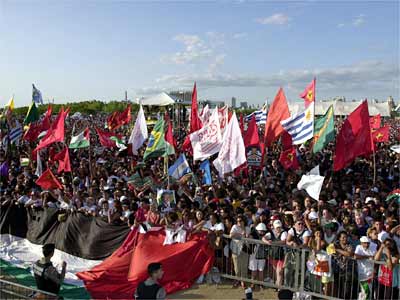follower
Refugee
On the eve of the opening day of World Social Forum 2003, here in Porto Alegre, Brazil, I found the article below, written by US writer and activist Noam Chomsky. It?s very interesting and informative and I thought some of you could be interested. It?s on the Library of Alternatives section of the Forum website. The main page is located in the link below, in 4 languages, in case you want to check it out:
http://www.forumsocialmundial.org.br/home.asp
29/08/2002
Why the World Social Forum?
After World War II, integration of the international economy ("globalization") has been increasing. By late 20th century, it had reversed the decline of the interwar period, reaching the level prior to World War I by gross measures ? for example, volume of trade relative to the size of the global economy. But the picture is considerably more complex.
Postwar integration passed through two phases: (1) the Bretton Woods period until the early 1970s; (2) the period since, after the dismantling of the Bretton Woods system of regulated exchange rates and controls on movement of capital. It is phase (2) that is usually called "globalization." Phase (2) is associated with so-called "neoliberal policies": structural adjustment and "reform" along the lines of the "Washington consensus" for much of the Third World, and since 1990, others, such as India and the "transition economies" of Eastern Europe; and a version of the same policies in the more advanced industrial societies themselves, most notably the US and UK. The two phases have been strikingly different. For good reasons, many economists refer to phase (1) as the "golden age" of industrial state capitalism, and phase (2) ? the "globalization period" ? as the "leaden age," with significant deterioriation of standard macroeconomic measures worldwide (rate of growth, productivity, capital investment, etc.), and increasing inequality. In the worlds richest country, for most of the workforce wages have stagnated or declined, working hours have dramatically increased, and benefits and support systems have been reduced. Through the "golden age," social indicators closely tracked GDP; since the mid-1970s, they have steadily declined, to the level of 40 years ago according to the most recent detailed academic study.
Contemporary globalization is described as expansion of "free trade," but that is misleading. A large part of "trade" is in fact centrally-managed, through intrafirm transfers, outsourcing, and other means. Furthermore, there is a strong tendency towards oligopoly and strategic alliances among firms throughout the economy, along with extensive reliance on the state sector to socialize risk and cost, a key feature of the US economy throughout this period. The international "free trade" agreements involve an intricate combination of liberalization and protectionism, in many crucial cases (particularly pharmaceuticals) allowing megacorporations to gain huge profits by monopolistic pricing of drugs that were developed with substantial contribution of the public sector. The enormous explosion of short-term speculative capital transfers in phase (2) sharply restricts planning options for governments, hence restricts popular sovereignty insofar as the political system is democratic. The constitution of "trade" is far different from the pre-World War I period. A large part now consists of manufacturing flows to the rich countries, much of it intrafirm. These options, along with the mere threat to transfer production, are another powerful weapon against working people and functioning democracy. The emerging system is one of "corporate mercantilism," with decisions over social, economic, and political life increasingly in the hands of unaccountable private concentrations of power, which are "the tools and tyrants of government," in James Madisons memorable phrase, warning of the threats to democracy he perceived two centuries ago.
Not surprisingly, the phase (2) effects have led to substantial protest and public opposition, which has taken many forms throughout the world. The World Social Forum offers opportunities of unparalleled importance to bring together popular forces from many and varied constituencies from the richer and poor countries alike, to develop constructive alternatives that will defend the overwhelming majority of the worlds population from the attack on fundamental human rights, and to move on to break down illegitimate power concentrations and extend the domains of justice and freedom.
http://www.forumsocialmundial.org.br/home.asp
29/08/2002
Why the World Social Forum?
After World War II, integration of the international economy ("globalization") has been increasing. By late 20th century, it had reversed the decline of the interwar period, reaching the level prior to World War I by gross measures ? for example, volume of trade relative to the size of the global economy. But the picture is considerably more complex.
Postwar integration passed through two phases: (1) the Bretton Woods period until the early 1970s; (2) the period since, after the dismantling of the Bretton Woods system of regulated exchange rates and controls on movement of capital. It is phase (2) that is usually called "globalization." Phase (2) is associated with so-called "neoliberal policies": structural adjustment and "reform" along the lines of the "Washington consensus" for much of the Third World, and since 1990, others, such as India and the "transition economies" of Eastern Europe; and a version of the same policies in the more advanced industrial societies themselves, most notably the US and UK. The two phases have been strikingly different. For good reasons, many economists refer to phase (1) as the "golden age" of industrial state capitalism, and phase (2) ? the "globalization period" ? as the "leaden age," with significant deterioriation of standard macroeconomic measures worldwide (rate of growth, productivity, capital investment, etc.), and increasing inequality. In the worlds richest country, for most of the workforce wages have stagnated or declined, working hours have dramatically increased, and benefits and support systems have been reduced. Through the "golden age," social indicators closely tracked GDP; since the mid-1970s, they have steadily declined, to the level of 40 years ago according to the most recent detailed academic study.
Contemporary globalization is described as expansion of "free trade," but that is misleading. A large part of "trade" is in fact centrally-managed, through intrafirm transfers, outsourcing, and other means. Furthermore, there is a strong tendency towards oligopoly and strategic alliances among firms throughout the economy, along with extensive reliance on the state sector to socialize risk and cost, a key feature of the US economy throughout this period. The international "free trade" agreements involve an intricate combination of liberalization and protectionism, in many crucial cases (particularly pharmaceuticals) allowing megacorporations to gain huge profits by monopolistic pricing of drugs that were developed with substantial contribution of the public sector. The enormous explosion of short-term speculative capital transfers in phase (2) sharply restricts planning options for governments, hence restricts popular sovereignty insofar as the political system is democratic. The constitution of "trade" is far different from the pre-World War I period. A large part now consists of manufacturing flows to the rich countries, much of it intrafirm. These options, along with the mere threat to transfer production, are another powerful weapon against working people and functioning democracy. The emerging system is one of "corporate mercantilism," with decisions over social, economic, and political life increasingly in the hands of unaccountable private concentrations of power, which are "the tools and tyrants of government," in James Madisons memorable phrase, warning of the threats to democracy he perceived two centuries ago.
Not surprisingly, the phase (2) effects have led to substantial protest and public opposition, which has taken many forms throughout the world. The World Social Forum offers opportunities of unparalleled importance to bring together popular forces from many and varied constituencies from the richer and poor countries alike, to develop constructive alternatives that will defend the overwhelming majority of the worlds population from the attack on fundamental human rights, and to move on to break down illegitimate power concentrations and extend the domains of justice and freedom.



